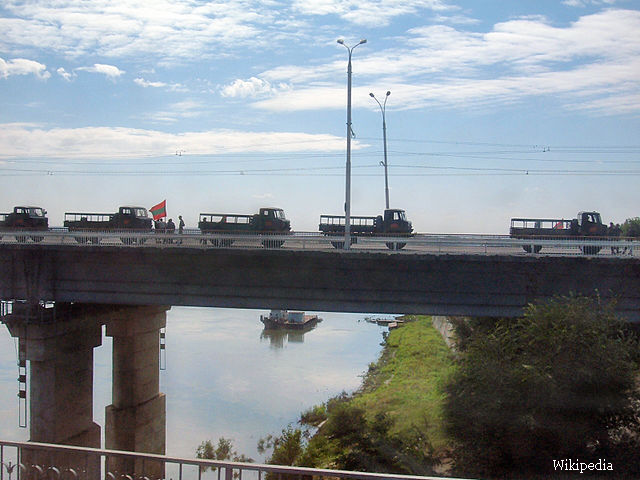The Trans-Dniestr War
The collapse of the Soviet Union has left room for armed conflicts.

Steliu Lambru, 10.08.2015, 11:11
The reforms initiated by the Soviet leader Mikhail Gorbachev, known as perestroika and glasnost, in mid 1980s, have been to no avail for the Soviet Union. Its collapse in 1991 confirmed the bankruptcy of the system set up in 1917 following Lenins Bolshevik revolution. But the collapse of the Soviet Union has left room for armed conflicts. These conflicts were actually frozen or postponed although the Communist regime had intimated that brutal intervention had done away with the likelihood of conflicts being solved by armed intervention.
The demise of the old Soviet system also meant rethinking the way in which Russia, the former USSRs successor, could maintain its leverage on the former Soviet republics. One of the methods was to encourage separatist movements. The first on the Kremlins list were Georgia and Moldova, Ukraine being considered still a faithful state to Moscow. As early as 1990, the self-styled republics of South Ossetia and Abhazia proclaimed their independence from Georgia while in Moldova there emerged the Trans-Dniester republic or Transdniester and Gagauzia.
The proclamation of the Moldovan republic of Dniester on September 1990 after the Republic of Moldova had proclaimed its sovereignty on June 23rd 1990 opened the path for separatist movements. According to the 1989 census, in Trans-Dniester there lived 39.9% Moldovans, 28.3% Ukrainians, 25.4% Russians and 1.9% Bulgarians. After Moldova became a UN member state, on March 2nd 1992, the Moldovan president Mircea Snegur authorized the military intervention against the rebel forces, after they had attacked police stations loyal to Chisinau on the eastern bank of the Dniester river and in Tiraspol. The rebels, backed by the Soviet troops of the 14th army, consolidated their control on a large part of the disputed region. The outnumbered Moldovan army has never been able to regain control over Transniestr, despite mediations in the past 25 years.
Mircea Druc was the Prime Minister of the Republic of Moldova between May 25th 1990 and May 28th 1991. When the conflict broke out, he was one of the leaders of the opposition Christian – Democratic Popular Front, in the opposition. In his opinion, the war in Transdniestr could not have been avoided:
I believe that the Russian – Romanian war on the Dniestr in 1992 was impossible to avoid, no matter how hard we would try now to put the blame on one party or another. The misfortune, for Besserabians and for those living on the left bank of Dniestr, was that the arsenals and the warehouses of weapons evacuated by the Soviet army from the countries of the former socialist camp had been left across the Dniestr. So, the place was full of armament from Poland, Czechoslovakia, Hungary, Bulgaria. The armament there was worth over 4 billion dollars. In 1989 and 1990, with Gorbachevs perestroika in full swing, the conflict between Tiraspol and Chisinau started, as Tiraspol, alongside other anti-Gorbachev and anti-perestroika forces could not admit that the Soviet Union was falling apart. They refused the simple truth that all empires disappear sooner of later. Until August 1991 they kept hoping they could save the Soviet Union. But all their hopes were scattered on December 5th 1991, when the presidents of Russia, Byelorussia and Ukraine signed the document that made the USSRs dismantling official. According to Mircea Druc, the war also had a strong economic motivation that was as important as the geo-strategic one. Mircea Druc:
“And then, something quite predictable happened. The interest groups in Chisinau were facing the dilemma of how to divide the Soviet heritage, the earnings of the collective farms (kolkhoz) and of the state-owned farms (sovkhoz) for which people living between rivers Niester and Prut had been working so hard, for over 50 years. In Transdniester, they used to talk about it in trivial terms, saying they would not allow the stupid Moldovans and the Fascist Romanians lay their hands on the 4 billion dollars. They used to curse Boris Eltin and other Russian leaders who had decided that everything on the territory of a former Soviet socialist republic was the property of that republic. They were determined not to share anything with anyone. So they decided to resist it. If it wasnt for this money, Chisinau and Tiraspol wouldnt have fought that hard and a third force would not have stepped in. I wonder why the Soviet troops and the center did not treat us, the Romanians from Bessarabia, the same way they treated the Baltic ‘aristocrats? In my opinion, they knew Romanians from Bessarabia were very determined and that bloodshed would be inevitable. But when there was an opportunity for Snegur to be given the 4 billions, they said no. Even Eltins democrats in Moscow decided to intervene with the 14th army. Eventually we found out that the entire arsenal had been sold and that Rutkoi and Cernomardin had decided where the money should go. 23 years later, theres nothing left, nothing to be shared.
The conflict left 600 people dead on both sides. In 1992, following a convention on the conflicts peaceful resolution, signed by the Republic of Moldova and Russia, a status-quo was decided, which in fact meant a continuation of the conflict between Chisinau and Tiraspol.






























